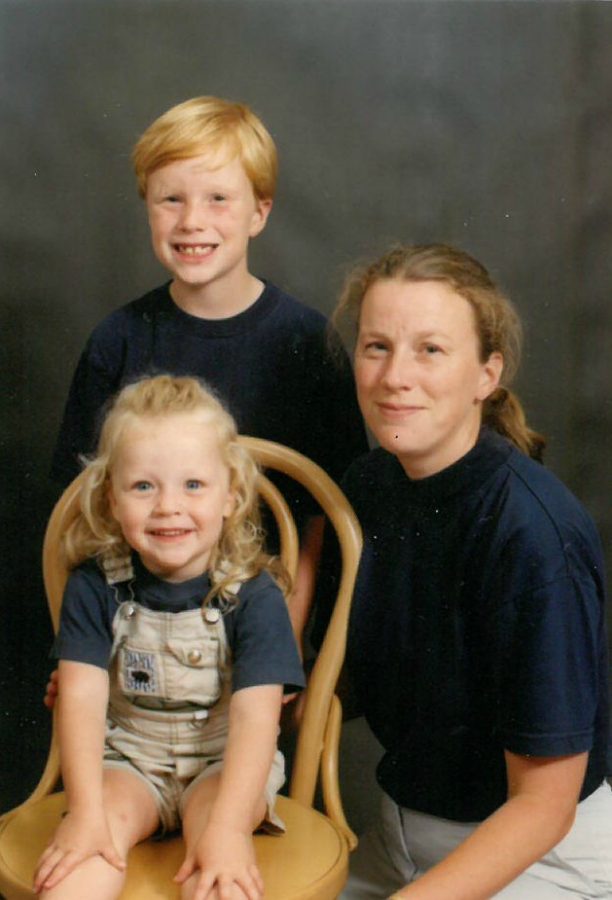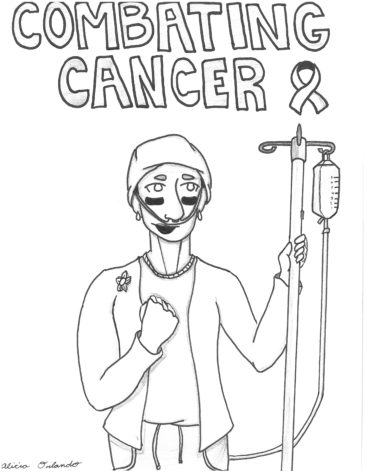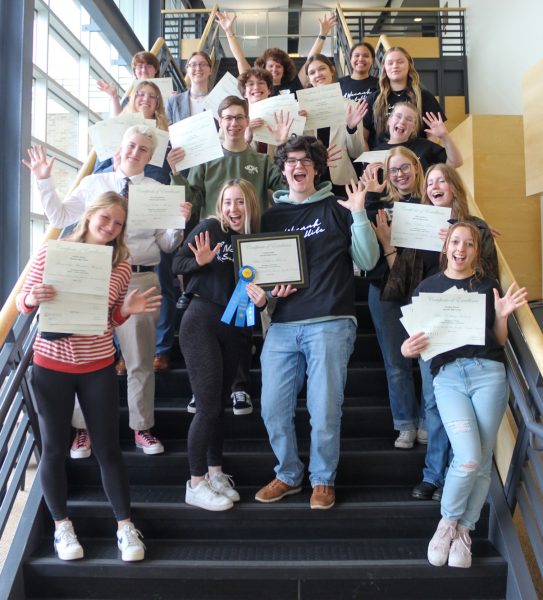Cancer: A Mother’s Will to Survive
A young mother of two has a new battle to fight: Cancer.
Just three years after the birth of her daughter, Joan Terry was diagnosed with Stage 1 Breast Cancer.
Because cancer knows no boundaries, this survivor’s story showcases how a mother protects her small children during the battle for her life.
She firmly recalled sitting in the doctor’s office awaiting her prognosis. The anticipation was awful, but nothing compared with the actual diagnosis. As the doctor rambled on about treatment options and timelines, she could only think of how she was going to tell her family.
With an immediate family of four and an extended family of 12 siblings, Terry knew she had all of the support in the world. The diagnosis shocked everyone due to no family history of breast cancer. Terry knew that she could not dwell on the situation. With a mother who had died of colon cancer at age 50, she did not question the diagnosis, instead she just looked at it as a bump in the road. Something she had to deal with and then move on to better things in the future.
The road to better things, however, was not always easy. “I took it one day at a time. I knew that this was not a death sentence and that I would get through it,” Terry explains.
Though the thought of the unknown always lingered in her mind. She was scared about not knowing if the doctors caught the cancer early enough, or if she was going to have a successful recovery, or if everything was going to be okay. “I didn’t want to die at 34. My kids were so young, and I had my whole life ahead of me!”
And those two things kept her fighting.
As she was rolled into the operation room, Terry remembers continually telling herself that “I will not lose this battle!” “I have a great team of doctors and God, all by my side helping me get over this little bump in the road.”
Within a few days of her lumpectomy, Terry returned to work. This is where she liked to be. She wanted to keep everything in her life as normal as possible. “If I concentrated on keeping my life as normal as possible, then I wouldn’t be so focused on the disease. However, family and friends did not always make this simple.”
“Since they cared a lot about me, they wanted to help out as much as they could.” Terry went on to explain that as great as this was, sometimes she felt a little overwhelmed and annoyed.
“The support was awesome, but sometimes I just wanted to cook and eat dinner with my immediate family and not always have people calling or sending us food.”
Before the physical effects of chemotherapy and radiation, Terry got away with telling as few people as she could about her diagnosis. She did not look any different than three months prior, so people could not tell something was wrong. “I didn’t tell people about my cancer because I did not want them to feel sorry for me. This would have only made me feel worse about the situation.”
Though everything changed when her hair started to fall off, one clump after another. Her first chemotherapy treatment had taken place and all of the doctors told her that she was going to lose her hair after this treatment. At first she did not, so she thought she would be one of the selective few who would not lose their hair. Three days later it was all gone. She was bald.
“I felt embarrassed at first. But I quickly got over that and just looked at it as a reality check. Everything was going the exact way the doctors said it would, so I thought things must be going well.”
In contrast, her son shares his memory of his mother’s battle.
“I will forever remember the day that I came home from school and saw my mom bald. I was too young to understand what was going on, but at that moment I knew something was not right,” said Terry’s son Matthew.
Being 8 years old, Matthew felt that he could not really do much for her. “I tried to comfort her by giving her hugs and getting anything that she wanted. I’d like to say I was a good little helper,” said Matthew with a little laugh. “I never once thought I would lose her to cancer, because I knew she was too stubborn to die.”
Matthew does remember the day that he went to the wig shop with her. He didn’t necessarily understand why she wanted a wig, but as time went on, and he grew older, he realized that she probably used one so she could look more “normal” and to draw attention away from herself.
“She’s not one that likes attention at all, so the more she could push it away from herself, the better,” he said.
Four days after her first chemotherapy treatment, Terry was back at work. She established this routine quite early in her treatments: Chemotherapy on Thursday, recovery at home on Friday, start feeling better on Saturday, back to work on Mondays. This routine took place six times, once every three weeks. Her bad days were quite obvious, the Thursday and Friday of Chemotherapy weeks; however, she said that she never truly felt like she had good days. Even though she did not feel as awful as she did on her bad days, she knew that there were more treatments to come, but she knew that the best day would be the day when all of this is over.
As she sat in the Chemo Room, Terry often found herself getting lost in her music, especially her favorite song, “Piano Man.” Looking around the room at the other eight cancer patients, she realized that feeling sorry for yourself does no good. “Instead you should think positive and look forward to the future, remembering that there are always people who are worse off than you in the same room.”
About a year and a half after her diagnosis, Joan Terry was declared cancer free.
“Initially I felt relieved when I heard those words come out of his mouth because I knew I would be able to live a healthy life, but I was still slightly worried, because once you have cancer, you’re never cancer free. There is always a chance that it could come back.”
Joan Terry’s story could have been totally different if she had not obtained a second opinion. Instead of a survival story, this could have been a remembrance of a death story. She knew how important it was to get a second opinion and is thankful for her boss, who had breast cancer herself, who pushed her to not take no for an answer. Terry stresses the importance of knowing one’s body, getting a second opinion and fighting for life.









